Lancashire dad left paraplegic by Manchester Arena bombing to scale Mount Kilimanjaro on a hand-bike for Spinal Injuries Association
and live on Freeview channel 276
“It was horrible,” says Mark, 44, from Chorley. “I always have the radio on at night so, when it started to break on the news, it was horrendous. It kept my wife and I up all night because we knew we were bound to know somebody who went to the gig.”
Tragically, Mark was correct.
“I went on social media and saw a tweet from Martin [Hibbert] with a picture of him and his daughter Eve at a restaurant before the concert,” he adds. “Straight away, I texted him, but I only got one tick on WhatsApp. Then, slowly, the news started to filter through.”
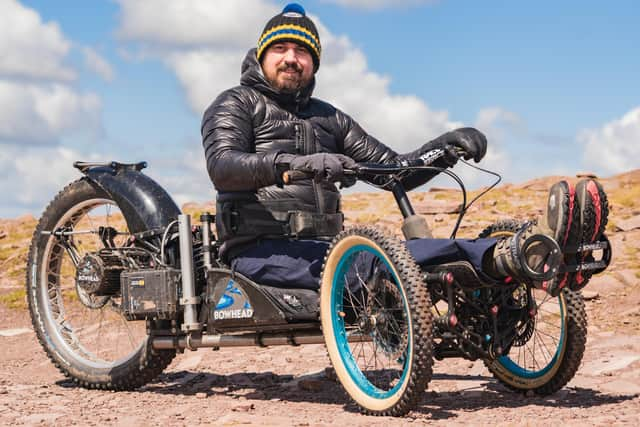

Advertisement
Hide AdAdvertisement
Hide AdMartin, a football agent from Heath Charnock, had taken his 14-year-old daughter Eve on a ‘daddy-daughter day’ to the Ariana Grande concert. As they were leaving, they found themselves just five metres away from the explosion which killed 22 people.
They were the closest to survive.
“I texted Eve’s mum Sarah and it was only then that we realised what had happened,” explains Mark. “Like everyone, it hit us hard - this was personal, this had happened on our doorstep, which just doesn’t happen. There was just this sense of horror.
“My mind immediately went to whether he was going to be okay,” he adds. “It was awful. I went to see him as soon as I could and he was heavily medicated; I hadn’t appreciated how serious the wounds were. It was devastating but, at the same time, it was a relief to see him alive.”
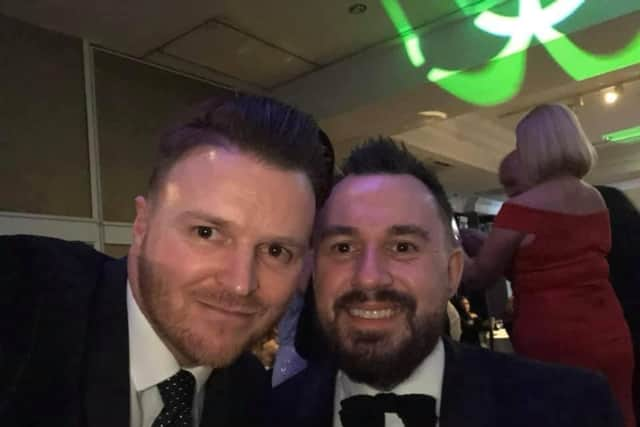

Left paralysed from the waist down, Martin’s injuries were described as the equivalent of ‘being shot 22 times at point blank range’, while the prognosis regarding Eve’s condition was that she was likely never to be able to see, hear, speak, or move again.
Advertisement
Hide AdAdvertisement
Hide AdMartin and Eve spent months recovering in the Southport Spinal Injuries Centre and Manchester Children’s Hospital respectively, with Martin also undergoing radical treatment in Queensland, Australia.
“The hardest thing for Martin was that Eve was also in hospital - frankly, he didn’t care about himself,” says Mark. “Try telling a dad to focus on himself when his daughter has ended up in hospital through no fault of her own. He wanted to recover, but his focus was on her.
“He showed me the x-ray and I just remember thinking there was no way he should’ve survived, and he knows that himself,” adds Mark. “He believed strongly that he survived for a reason. As long as I’ve known Martin, the word ‘stubborn’ is the one which comes to mind.”
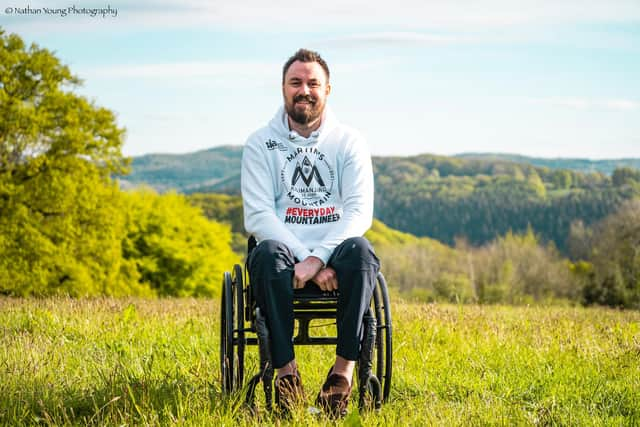

Requiring ultra-specialist care, Martin was ably supported by the Spinal Injuries Association (SIA), but was shocked to learn that just one in three people with spinal cord injuries receive treatment at specialist centres.
Advertisement
Hide AdAdvertisement
Hide AdAppreciating how the SIA had changed his life, he resolved to do something to change that.
Five years after that life-changing night, Martin is setting his sights high, resolving to summit Mount Kilimanjaro, the loftiest peak in Africa standing at 5,895m. Aiming to raise £1m for the Spinal Injuries Association through the endeavour, which is scheduled to take place in June, he is unwavering in his resolve.
“Tell Martin that he can’t do something and he’ll do it twice just to show you,” says Mark with a chuckle. “He’s that kind of person: resilient. He’s maintained all the way through that he wasn’t going to let the terrorist win by letting it stop him do anything.
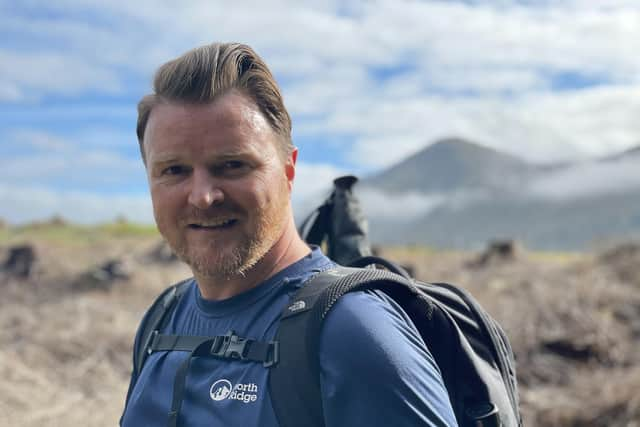

“When he mentioned Kili, I just went ‘give over’, but he was serious,” adds Mark, with Martin having become a trustee with the SIA in 2019. “He was going to show the world that nothing is impossible and that he was living a fulfilled life by taking things on, even if they’re huge challenges.
Advertisement
Hide AdAdvertisement
Hide Ad“Looking back and seeing how far he’s come since then and understanding the work he’s done with help from the Spinal Injury Association, it’s nothing short of a miracle,” he continues. “I don’t know how I’d have found the resolve to get up and go again had the roles been reversed.”
Martin is set to use a specially-adapted mountain trike to complete the climb alongside Mark and 11 other team members, including Rob Grew, who ran into the arena immediately after the explosion to help, and Stuart Wildman, the head nurse who treated Martin at the major trauma centre at Salford Royal.
The climb, part of a campaign known as Martin’s Mountain, will involve a 45-mile ascent on the custom hand-bike, which will be operated using levers, and a gruelling week of daily 12-hour climbs. Temperatures at the summit can reach -20°C, with about one in three people failing to reach the peak.
Some estimate the prospective success rate for wheelchair-users at just 10%.
Advertisement
Hide AdAdvertisement
Hide Ad“Ultimately, if somebody’s told him that he has a 10% chance, Martin will think - being the huge film buff he is - of that line from Dumb & Dumber: ‘So you’re telling me there’s a chance?’” says Mark with a laugh. “It’s not going to be easy - I’m nervous myself - but nothing will beat Martin.”
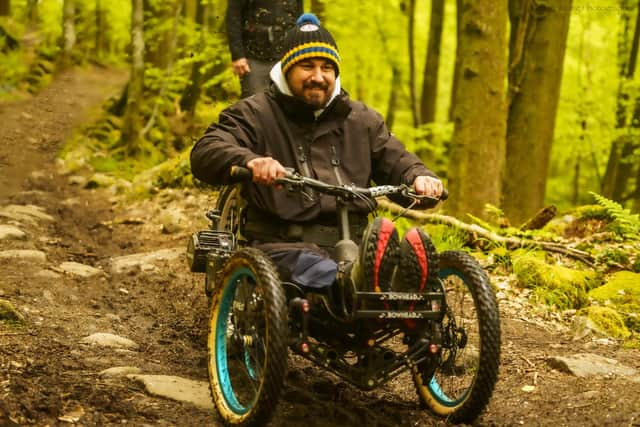

When his bike is ready, Martin, who will have to consume 5,000 calories a day during the climb, will be doing practice runs in Wales and the Lake District but, in the meantime, is preparing for another crucial factor the group will encounter during the ascent: altitude.
“You can do all the training and walking you want, but it’s all about how you react to the altitude,” says Mark, whose friend Nicola Palmer at Burnley College has organised for the group to use the facility’s altitude chamber to better acclimatise. “It’s been fascinating.
“It’s a really weird feeling - the first time, I felt lightheaded, the second time we went higher and I felt the benefits straight away,” adds Mark. “All we were doing was walking around and talking, but even then, you could see the impact on our blood oxygen readings.
Advertisement
Hide AdAdvertisement
Hide Ad“We can’t say thank-you enough to Burnley College; using the altitude chamber has been priceless.”
Mark has known Martin for over 25 years, with the pair having met whilst working together at Barclays bank, where Martin took the then-18-year-old Mark under his wing. They’ve been friends ever since and, if Mark knows one thing, it’s that his mate is on a mission.
“The man’s a freak,” he says, a smile painted across his face. “Even though there are elements out of his control, I still don’t think there’s any chance Martin won’t be able to do it provided his body allows it. He’s such an inspirational person.
“We can’t wait to get going because, take the nerves away and there’s nothing but genuine excitement,” adds Mark. “We’ve got the chance to experience something very few people experience, something uniquely special.”
Advertisement
Hide AdAdvertisement
Hide AdShould Martin succeed and reach Kilimanjaro’s peak, it’s believed that he’ll be one of the very first people to reach the summit with a complete spinal injury. And, along the way, he will carry a picture of his ‘princess’ Eve, now 19, who has amazed medics with her progress.
“That night was a life-changing incident,” says Mark. “But Martin’s not let it be life-defining.”
Martin’s Mountain is proudly sponsored by Coloplast. To donate, head to https://martins-mountain.justgiving-sites.com/.